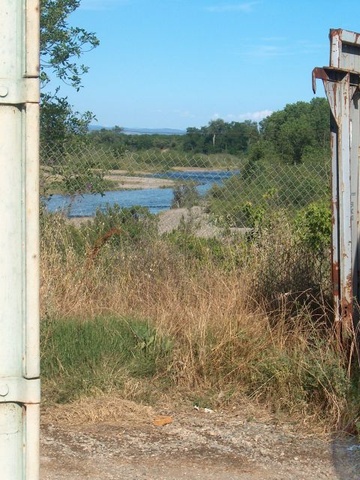 The Yuba River as seen from between rusting trash bins at the Recology Yuba-Sutter transfer station in Marysville. Photo by queerbychoice. Ecology is the study of ecosystems: the way plants, animals, and other life forms affect and are affected by each other and their physical environment. This page provides information about our local ecosystems and actions that help or harm them.
The Yuba River as seen from between rusting trash bins at the Recology Yuba-Sutter transfer station in Marysville. Photo by queerbychoice. Ecology is the study of ecosystems: the way plants, animals, and other life forms affect and are affected by each other and their physical environment. This page provides information about our local ecosystems and actions that help or harm them.
Our local native plants generally cluster into five plant communties: central oak woodland, valley grassland, yellow pine forest, riparian forest, and freshwater marsh. These five plant communities provide five distinct types of habitats for different types of wildlife. Thus, they could be considered to be the five basic types of ecosystems in the Yuba-Sutter area. Many types of invasive weeds and invasive animals currently threaten the diversity of our local ecosystems.
Ecological Preserves
- Bobelaine Audubon Sanctuary
- Butte Sink National Wildlife Refuge
- Daugherty Hill State Wildlife Area
- Feather River State Wildlife Area
- Fremont Weir State Wildlife Area
- Gray Lodge State Wildlife Area
- Plumas National Forest
- Spenceville State Wildlife Area
- Sutter Buttes State Park
- Sutter National Wildlife Refuge
- Tahoe National Forest
Water Conservation
The Feather River is the main source of water for the California State Water Project, providing water to central and southern California. Most of the water supply for people in Yuba and Sutter Counties also comes from the Feather River watershed—from various lakes and streams that provide water to the Feather River and its major tributaries, the Yuba River and Bear River.
The Yuba County Water Agency and Sutter County Water Agency are involved in many water-related issues, from irrigation to hydroelectricity. Local irrigation districts include Cordua Irrigation District and Nevada Irrigation District.
Sewage in the Yuba-Sutter area is treated at Stonegate Village Sewage Treatment Plant and Wheatland Water District Wastewater Treatment Plant.
Pollution
Land and Water Pollution
There are no Superfund sites in Yuba or Sutter counties. However, Beale Air Force Base in Yuba County has released a total of 129,512 pounds of federally classified Toxic Release Inventory chemicals to land. The main chemical released is xylene (mixed isomers). Exposure to xylene from soil or groundwater can cause headaches, dizziness, confusion, balance problems, breathing problems, memory problems, delayed reaction time, loss of muscle coordination, stomach discomfort, and irritation of the skin, eyes, nose, and throat. At very high levels, it can cause unconsciousness and death. People who drink contaminated groundwater or who dig or garden in soil contaminated by leaking underground storage tanks are at risk of these symptoms.
Sutter County is ranked in the 90th percentile for most sheep waste created among all counties in the United States, but it is not known to contain significant toxic chemicals from non-animal sources.
Air Pollution
The average lifetime diesel soot cancer risk for a resident of Sutter County is 1 in 6,618. This risk is 151 times greater than the EPA-determined acceptable cancer level of 1 in a million.
The average lifetime diesel soot cancer risk for a resident of Yuba County is 1 in 10,417. This risk is 96 times greater than the EPA-determined acceptable cancer level of 1 in a million.
In both counties, the lifetime cancer risk from diesel soot far exceeds the risk of all other air pollutants tracked by the EPA combined. The cancer risk from all other air pollutants combined is 1 in 35,714 in Sutter County and 1 in 41,667 in Yuba County.
Landfills
Recycling
- Ayala Recycling
- Big Al's Market
- EH Recycling
- El Chico Produce Market
- Empire Steel
- North Beale Recycling Center
- Olivehurst Recycling Center
- Recology Yuba-Sutter
- Recycling Industries
- Robles Recycling
- Yuba City Scrap and Steel
- Yuba-Sutter Recycles!


